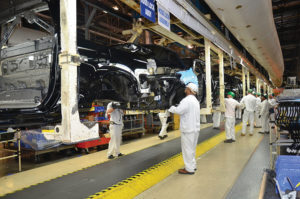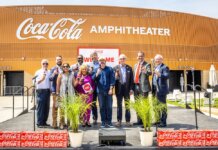
Honda Manufacturing of Alabama (HMA) finished 2019 on a high note, producing 351,708 minivans, sport utility vehicles, pickup trucks and V-6 engines at its Lincoln facility. That number, combined with HMA’s total production since the plant opened in 2001, makes it the first automaker in Alabama to reach a five million production milestone. Preliminary end-of-year reporting showed that the plant produced 146,352 all-new Pilot SUVs, 125,497 Odyssey minivans, 29,185 Ridgeline pickup trucks and 50,674 all-new Passport SUVs in 2019.
“Our achievements have been made possible through the commitment and dedication of our associates to build only the best for our Honda customers,” says Mike Oatridge, senior vice president at HMA. “We are grateful for the support that Honda has experienced with our communities, our local and state leaders and our supplier partners. We are pleased that the success of our operations has had such a positive impact to the people — and to the economy — of the state of Alabama.”
The HMA facility is the exclusive global production source for the Odyssey, Ridgeline, Passport and Pilot models, each of which made Cars.com’s “Top 10 Most American-Made Vehicles” list in 2019 at second, third, fourth and seventh place, respectively.
The production numbers reflect the facility’s economic impact in the state as well. A study released in August 2019 by the Economic Development Partnership of Alabama (EDPA) and conducted with the Center for Business and Economic Research at the University of Alabama revealed that HMA contributed more than $12 billion to the state’s economy in 2018, 5.4 percent of the state’s gross domestic product.
In addition, the study points out that HMA and its suppliers were responsible for more than 45,647 jobs in the state. The company had a total payroll of $590.5 million, an average of $79,202 per employee, 75 percent more than the average earnings for an Alabama worker.
“This study demonstrates the magnitude of Honda’s Alabama operation and how important it is to the state’s economy,” EDPA Executive Vice President Steve Sewell said in an article distributed by HMA last summer. “At the same time, it underscores the fact that Alabama has provided the skilled workforce and positive business climate that a world-class company like Honda needs to be successful in a highly competitive global business.”
In April 2019, Honda launched its first-ever factory pop-up, Honda LIVE!. The event, part of the automaker’s annual Gear Up Your Career Workforce Development Initiative, brought the factory floor to the Honda Indy Grand Prix of Alabama at Barber Motorsports Park in Birmingham. Over the course of three days, HMA associates built a Honda Passport live on stage from frame to road-ready sport utility vehicle. While some components were pre-produced at the plant to ensure safety and quality, race attendees were offered an up-close look at vehicle assembly, including the installation of more than 2,000 parts from headlights to tailgate.
The trackside attraction also gave more than 2,000 area students a behind-the-scenes glimpse of the manufacturing process. Focusing on increasing interest in auto industry careers is a priority, says Oatridge. “We partner with local and state leadership, the Alabama Workforce Council and the Alabama Industrial Development Training on developing technical skills and initiatives. Honda is also fortunate to have a strong partnership with local community and technical schools, as well as state colleges like Auburn University, University of Alabama, Alabama A&M University, Alabama State University and UAB to draw students with technical skills into business and to help make sure these students know the opportunities that are available to them.”
HMA also regularly collaborates with local schools and churches, food banks and United Way organizations. In 2019, it hosted five community appreciation receptions, one in each of the company’s surrounding counties, to recognize the support the plant has received since it began operations in 2001.
“Our associates also play a large role in Honda’s community involvement by volunteering their personal time with several of these local organizations,” says Oatridge. “Honda’s fundamental belief is that we want to be a company that society and our community want to exist. HMA associates sit on many boards that support the community, including the Governor’s Task Force on Workforce Development, McWane Science Center, Economic Development Partnership of Alabama and countless other organizations. Engagement and a strong relationship between our associates and the community are key, and our hope is to continue to grow these activities and be a positive role model in the community and in the state.”
Katherine MacGilvray is a Huntsville-based freelancer for Business Alabama.



